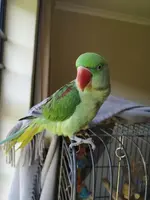I agree with Noodles completely, and I really think that a visit to either a Certified Avian Vet or an Avian Specialist that includes routine, baseline blood-work is an extremely good idea here, because it will include all of the basic metabolic blood-work, and this will tell you whether or not he's suffering from any nutritional deficiencies that you need to work on, as well as whether or not his liver and kidney function is being effected by his past/current diet, and what you need to do in order to modify his diet to get him back on track. Alexandrine's are notorious for developing Fatty Liver Disease, usually due to an all-seed diet that includes sunflower seeds, and then little to no fresh veggies. It's perfectly fine and actually healthy both physically and mentally for parrots to eat seeds as a small part of their regular, daily diet (as pellet do not exist in nature), however the seed-mix should only be a small portion of his regular, daily diet, and it absolutely must be a healthy, varied seed-mix that contains many different, low-fat seeds, legumes, grains, and other pulses, as well as different dried veggies, fruits, etc., and it should NEVER contain any sunflower seeds or nuts, specifically no peanuts. And he needs to be given a large portion and variety for fresh veggies every single day, and the best way to figure out what veggies he likes (and the cheapest way too) is by trying different "Chop" recipes that contain many different fresh veggies. Once you figure out what fresh veggies he likes best, then you can make-up large batches of them, put them in single-serving baggies, and then freeze the baggies. Then you can just pull out a single baggie each night/morning and put it in the fridge to thaw out for the next day. And fresh fruits, while great as a very small part of their diet, need to be given sparingly, as they are all full of sugar, which is turned into fat and stored in the liver, just like the fat from sunflower seeds and nuts are.
I think if you can get him to an experience Avian Vet and get some routine blood-work done so that the Avian Vet can get an overall picture of his health, then you and your Avian Vet can work together and make a plan to modify his diet, his environment, his routine, his light and sleeping schedule, etc., and this way you can get his health moving in the right direction pretty quickly.


